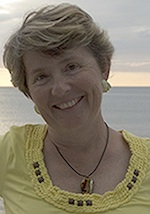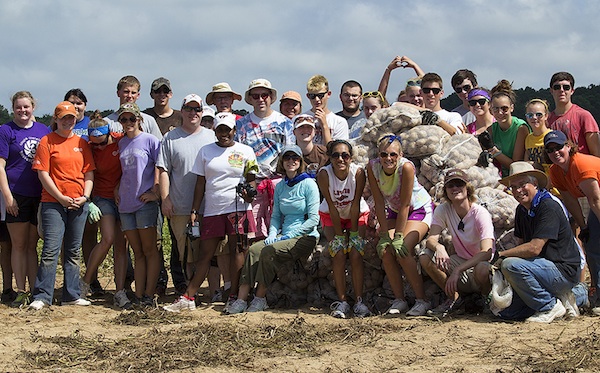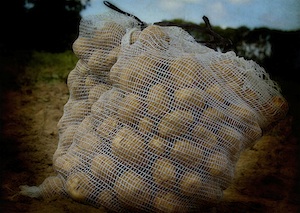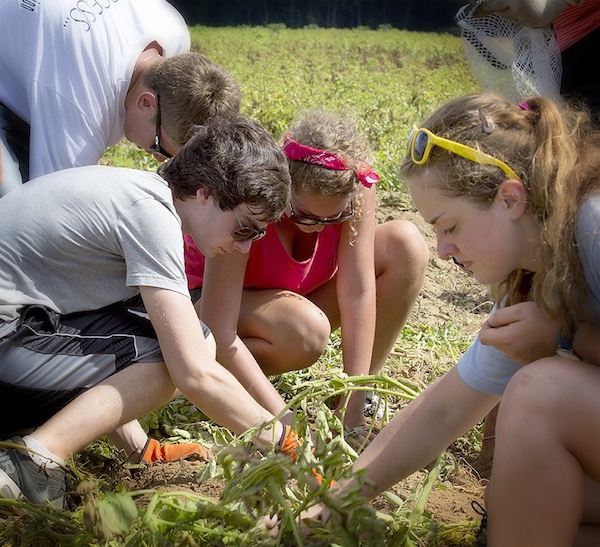SHER: This Place Gets in Your Blood
 By SHER HOROSKO
By SHER HOROSKO
Cape Charles Wave
July 17, 2013
There are places that get in your blood. This is surely one of them.
Just last week I met the man who farms the field outside my window. “What’s your name?” I ask. “Bud” he says — “You know like Bud Light. Lived here all my life. Never gonna leave.”
I could ask him what it is about the place, but I don’t. I track the gleam in his eye instead. His love spills into the sandy soil, sails the windswept fields and dips into the sea close by.
The land-and-blood-thing is strong in him.
Along the back roads toward Kiptopeke, the fields of corn stretch into the arms of Virginia pines. In Cape Charles Harbor, small orange claws and tiny fins poke through the slats of wooden baskets.
“Will I ever get used to this?” I ask myself while topping my oatmeal with handfuls of blackberries picked from a neighbor’s yard.
This is a land of abundance. The horn of plenty is all filled up.
But not for all.
It is the riddle of Abundance living next door to Hunger that brings me to a hot and dusty field after a midnight run to the ER. Tired, disheveled, and barely thrown together, I pull up to a land lit with color.
The gleaners are here, 46 of them from three Virginia churches. White-laced bags of potatoes, about 8,000 pounds’ worth, are stacked and nestled in the powdery earth and spent green vines.
Gleaning means to “gather what is left.”
Local farmer David Long invites the Society of St. Andrew to come to his field each year to share in the abundance he co-creates on Virginia’s Eastern Shore. Every bit of what’s gathered goes to the hungry people who live here.
Looking over the gleaners, it is clear to me that rescuing potatoes requires strong calves or dirt-coated knees. Surrendering to T-shirts wrung with sweat is part of the whole thing, too, and so is a pretty sore back at day’s end.

Volunteer gleaners: Like the hands in the background, hearts are at work. (Photos by Sher Horosko)
CONTINUED FROM FIRST PAGE
But the cause is a strong one.
“One out of every five kids in this country doesn’t know where their next meal is coming from,” says Bill Leach, education director for Harvest for Hope. “Here [in Northampton County], it’s one in three. Most are kids of single moms working 40-60 hours a week.”
It is a terrific riddle: How can people work so hard and scrape for food? How come abundance doesn’t make it to every American table? How can all these little stomachs growl just behind the walls next door?
“You’re skeptical at first,” says Tim Blanton. “Once you get here and do the hard work, you appreciate the farmers. My first year here, I visited a nursing home and was surprised at what they eat.”
He tells me they don’t get enough and what they get isn’t nutritious. Hunger is in places we don’t think about.
 Born-here Emily Taylor jumps in with a watermelon story. “I’ve been up and down this Shore most of my life and I’ll never forget going to the food bank after we picked watermelons,” she said. “This little girl came in with her mom; she never had her own watermelon before. I couldn’t believe how excited she was.”
Born-here Emily Taylor jumps in with a watermelon story. “I’ve been up and down this Shore most of my life and I’ll never forget going to the food bank after we picked watermelons,” she said. “This little girl came in with her mom; she never had her own watermelon before. I couldn’t believe how excited she was.”
Maybe a touch more excited than the storyteller who admitted they are both the changers and the changed. “By the end of a week like this we are family,” Tim declares. “This changes you.”
Minaka Gunesekera from Blacksburg tells me she wants to be a pastor where gleaning is a way of life. “I’d rather be out here in the fields changing things than complaining about the world around a coffee table,” states Minaka. Her quiet fire is palpable.
I thank them all, break down my tripod , shake the dirt from my sandals and head for my car. Bill and I are still talking.
He left a job in a pharmaceutical company to work in hot southern fields building human bridges between Hunger and Abundance.
“There it is,” I say to myself — “that gleam-thing in his eyes, just like Bud Light.”
Years ago, Mother Teresa said that we will feel peace when we remember we belong to each other. Driving away from the potato field just south of Cape Charles, I take a last look back.
Is that part of the answer to my riddle rising from that field?

No clean hands here.

Three gleaners: Emily Taylor, Minaka Gunesekera, Tim Blanton
Sher Horosko’s commentary is an occasional Wednesday feature of the Wave. A recent transplant to the Eastern Shore, Sher writes on nature and spirituality at sherhoroskoblogdotcom.wordpress.com.




















The themes here are worth contemplating. Two quotes in particular: “I’d rather be out here in the fields changing things than complaining about the world around a coffee table . . .” and the Mother Teresa quote, “we will feel peace when we remember we belong to each other.”
In a society — and a community — where finding fault and tearing each other down over our differences is the new normal and which gets in the way of actually working on the solution together, Sher nails it with this sweet story on the love of place and the purpose of living — to connect and help others, not just ourselves.
It’s a hard thing for most of us to do — to give up a career to walk the fields, gleaning for others less fortunate, like Bill. But, there is much we can do that involves simply coming together. Civil communication. Working on problems that affect us and those around us. If you think kids without enough food is not your problem, think again. Those kids will grow up to be adults and a part of this society in which we all live. Their problems are indeed our collective problems.
If we could just take the construct of “gleaning” and apply it to other facets of our lives, what a difference we could all make. Thanks, Sher for a view into a world many of us don’t always see and appreciate.
Thank you Sher for sharing your beautiful uplifting story. Good on all of you involved in this wonderful endeavor.
Bruce, thank you for putting into words what I had already mentally composed. And, Sher, thank you for using your talents of writing and photography to remind us that we each have a role in the collective well-being of our community.
Thank you for this affirmation of The Society of Saint Andrew’s year-long gleaning efforts as well as the Harvest of Hope program, combining gleaning and education with spirituality. To learn more, become involved, and offer support, please go to http://www.endhunger.org.
Sher, you definitely have a way with words and your ability to “romance” with words. I throughly enjoy your writings. I lived on the shore from ’74 to ’80 and things were pretty bad back then as far as poverty goes — obviously not much has changed over all the years.
Thank you for the thoughtful comments here.
Bruce, your narrative, supported by Carla and Anne, could be the basis for a meaningful talk over every dinner table In America.
And Jeff, thank you for your kind comments too. There is only so much you can say in a little story but I will add these two things: those potatoes will be turned into 24,000 servings of food for Virginia Shore residents. And that is just what these folks picked on a single morning. I can barely go outside today, it is so hot, and I know for certain they are on their hands and knees in some field, harvesting food for the hungry.
So while Hunger still lives next door, just as you say, it is also true that a bright light is shining in these abundant Virginia fields.
We can all jump in and make the light even brighter. It truly is so very easy. Peace is the gift returned to us.
Thank you all.
Ms. Horosko, your story reminds me of the times when my family along with other black families used to work in the fields. It was very hot and sweaty sometimes. If the work was close to Route 13, passers-by would sometimes stop, observe us and make comments like, boy or gal what ya’ll doing? Or a statement like, ain’t they cute?, chuckling as they got back into their vehicles and drove off. After “getting up” potatoes, we were sometimes allowed to glean crops which had failed to be harvested. This gleaning went into our food reserves or for our next meal. If this place gets in your blood, then I would hope that it would affect your pocketbook also. Go into the black neighborhoods, and then let the world know about the poor conditions and issues facing these areas. Nothing personal, but don’t take advantage of this place — make it better for everyone.